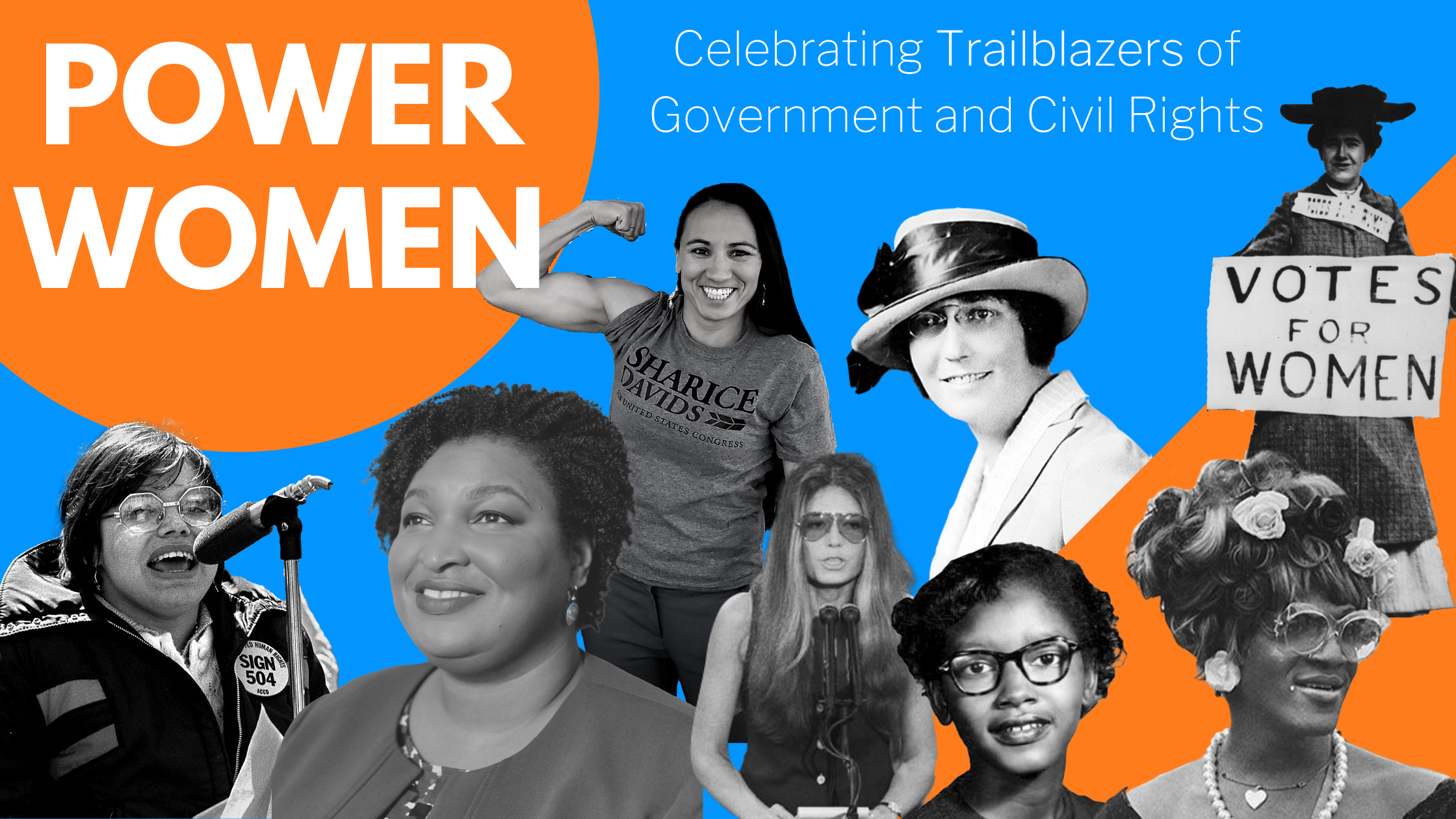8 Women who Paved the Way for Civil Rights and a More Inclusive Government

[vc_row full_width=”stretch_row” parallax=”content-moving” css=”.vc_custom_1614964882438{padding-top: 100px !important;padding-bottom: 100px !important;background-position: center !important;background-repeat: no-repeat !important;background-size: cover !important;}”][vc_column][vc_single_image image=”21381″ img_size=”full” css_animation=”slideInDown”][vc_empty_space][vc_custom_heading text=”Moving forward with them at our back.” font_container=”tag:h2|text_align:center|color:%233298cb” google_fonts=”font_family:Montserrat%3Aregular%2C700|font_style:700%20bold%20regular%3A700%3Anormal”][vc_separator][/vc_column][/vc_row][vc_row][vc_column width=”1/1″][vc_column_text]As we strive everyday to work toward a more equitable future, we can’t help but reflect on the many women who we have to thank for paving the way to an inclusive world.
March is a month-long celebration of the contributions of countless women who have made our world a better place. As part of this effort, we’re excited to recognize the specific achievements of a small handful of women who have impacted our lives.[/vc_column_text][vc_separator color=”custom” accent_color=”#ff7c1d”][/vc_column][/vc_row][vc_row][vc_column width=”1/2″][vc_custom_heading text=”Emmeline Pankhurst” google_fonts=”font_family:Montserrat%3Aregular%2C700|font_style:700%20bold%20regular%3A700%3Anormal”][/vc_column][vc_column width=”1/2″][vc_custom_heading text=”Champion of the UK Women’s Suffrage Movement” google_fonts=”font_family:Nunito%3A300%2Cregular%2C700|font_style:400%20regular%3A400%3Anormal”][/vc_column][/vc_row][vc_row][vc_column width=”1/3″][vc_single_image image=”21403″ img_size=”full”][/vc_column][vc_column width=”2/3″][vc_column_text]”From 1895 she held a succession of municipal offices in Manchester, but her energies were increasingly in demand by the Women’s Social and Political Union (WSPU), which she founded in 1903 in Manchester.
Regarding the Liberal government as the main obstacle to woman suffrage, she campaigned against the party’s candidates at elections, and her followers interrupted meetings of cabinet ministers.
In 1926, upon returning to England, she was chosen Conservative candidate for an east London constituency, but her health failed before she could be elected.”
Source: Britannica[/vc_column_text][/vc_column][/vc_row][vc_row][vc_column width=”1/2″][vc_custom_heading text=”Adelina Otero-Warren” google_fonts=”font_family:Montserrat%3Aregular%2C700|font_style:700%20bold%20regular%3A700%3Anormal”][/vc_column][vc_column width=”1/2″][vc_custom_heading text=”First Female Government Official in New Mexico” google_fonts=”font_family:Nunito%3A300%2Cregular%2C700|font_style:400%20regular%3A400%3Anormal”][/vc_column][/vc_row][vc_row][vc_column width=”2/3″][vc_column_text]”Adelina ‘Nina’ Otero-Warren’s enthusiasm for suffrage proved crucial to the movement in New Mexico, where she became a leader in the efforts of the National Woman’s Party to organize the state.
Descended from Hispanos, or settlers of Spanish-speaking origins, she garnered support for women’s suffrage among Spanish- and English-speaking communities.
She later served as New Mexico’s first female government official and made an unsuccessful congressional bid in 1922.”
Source: Library of Congress[/vc_column_text][/vc_column][vc_column width=”1/3″][vc_single_image image=”21401″ img_size=”full”][/vc_column][/vc_row][vc_row][vc_column width=”1/2″][vc_custom_heading text=”Claudette Colvin” google_fonts=”font_family:Montserrat%3Aregular%2C700|font_style:700%20bold%20regular%3A700%3Anormal”][/vc_column][vc_column width=”1/2″][vc_custom_heading text=”Boycotting racist laws before Rosa Parks” google_fonts=”font_family:Nunito%3A300%2Cregular%2C700|font_style:400%20regular%3A400%3Anormal”][/vc_column][/vc_row][vc_row][vc_column width=”1/3″][vc_single_image image=”21402″ img_size=”full”][/vc_column][vc_column width=”2/3″][vc_column_text]”When [Claudette Colvin] was 15, she refused to move to the back of the bus and give up her seat to a white person — nine months before Rosa Parks did the very same thing.
Most people know about [Rosa] Parks and the Montgomery, Ala., bus boycott that began in 1955, but few know that there were a number of women who refused to give up their seats on the same bus system. Most of the women were quietly fined, and no one heard much more.
Colvin was the first to really challenge the law.
When asked why she is little known and why everyone thinks only of Rosa Parks, Colvin [said] the NAACP and all the other black organizations felt Parks would be a good icon because she was an adult.”
Source: NPR[/vc_column_text][/vc_column][/vc_row][vc_row][vc_column width=”1/2″][vc_custom_heading text=”Gloria Steinem” google_fonts=”font_family:Montserrat%3Aregular%2C700|font_style:700%20bold%20regular%3A700%3Anormal”][/vc_column][vc_column width=”1/2″][vc_custom_heading text=”Political Writer. Activist. Feminist.” google_fonts=”font_family:Nunito%3A300%2Cregular%2C700|font_style:400%20regular%3A400%3Anormal”][/vc_column][/vc_row][vc_row][vc_column width=”2/3″][vc_column_text]As a journalist in the late 1950s/60s New York Steinem found that “Getting plumb assignments was tough for women . . . when men ran the newsrooms and women were largely relegated to secretarial and behind-the-scenes research roles.”
Steinem gained national attention in 1963 when she was hired to go undercover in Hugh Hefner’s Playboy Club. “Steinem struggled to be taken seriously as a journalist after this assignment.”
In 1968, Steinem helped found New York magazine, where she became an editor and political writer. Dedicated to the women’s rights, Steinem led marches and toured the country as sought after speaker. In 1972, Steinem along with other notable feminists formed the National Women’s Political Caucus that continues to support gender equality to this day.
Source: National Women’s History Museum[/vc_column_text][/vc_column][vc_column width=”1/3″][vc_single_image image=”21404″ img_size=”full”][/vc_column][/vc_row][vc_row][vc_column width=”1/2″][vc_custom_heading text=”Judy Heumann” google_fonts=”font_family:Montserrat%3Aregular%2C700|font_style:700%20bold%20regular%3A700%3Anormal”][/vc_column][vc_column width=”1/2″][vc_custom_heading text=”Voice of Section 504 (the Rehabilitation Act of 1973)” google_fonts=”font_family:Nunito%3A300%2Cregular%2C700|font_style:400%20regular%3A400%3Anormal”][/vc_column][/vc_row][vc_row][vc_column width=”1/3″][vc_single_image image=”21405″ img_size=”full”][/vc_column][vc_column width=”2/3″][vc_column_text]
In the 1970’s many public spaces and resources were still “…not accessible to the millions of disabled people who lived in the United States.” At that time, Section 504 “…operated on the social model of disability, which focuses not on a person’s “impairment,” but on ways in which their surroundings could better accommodate their needs.”
In 1977, “…demonstrators across the country began occupying federal offices. In San Francisco, Judy Heumann…and Kitty Cone…showed up at the regional H.E.W. office. With them were more than 100 other disabled protesters, interpreters and personal care aides.” Almost a month later the regulation was implemented.
“Though Section 504 applied only to federally funded buildings, the regulations laid the groundwork for the Americans With Disabilities Act, which extended the protections to all private institutions and workplaces when it was enacted 13 years later.”
Source: The New York Times[/vc_column_text][/vc_column][/vc_row][vc_row][vc_column width=”1/2″][vc_custom_heading text=”Marsha P. Johnson” google_fonts=”font_family:Montserrat%3Aregular%2C700|font_style:700%20bold%20regular%3A700%3Anormal”][/vc_column][vc_column width=”1/2″][vc_custom_heading text=”Trans Activist and LGBTQ+ Icon” google_fonts=”font_family:Nunito%3A300%2Cregular%2C700|font_style:400%20regular%3A400%3Anormal”][/vc_column][/vc_row][vc_row][vc_column width=”2/3″][vc_column_text]”Marsha ‘Pay it No Mind’ Johnson (1945-1992) was a Black trans woman who was a force behind the Stonewall Riots and surrounding activism that sparked a new phase of the LGBTQ+ movement in 1969. Along with Sylvia Rivera, she established the Street Transvestite Action Revolutionaries (STAR) in 1970–a group committed to supporting transgender youth experiencing homelessness in New York City. Marsha P. Johnson was tragically murdered on July 6, 1992 at the age of forty-six.
Marsha P. Johnson is now one of the most venerated icons in LGBTQ+ history, has been celebrated in a series of books, documentaries, and films. Her actions and words continue to inspire trans activism and resistance, and will continue to do so well into the future. ”
Source: GLSEN[/vc_column_text][/vc_column][vc_column width=”1/3″][vc_single_image image=”21406″ img_size=”full”][/vc_column][/vc_row][vc_row][vc_column width=”1/2″][vc_custom_heading text=”Sharice Davids” google_fonts=”font_family:Montserrat%3Aregular%2C700|font_style:700%20bold%20regular%3A700%3Anormal”][/vc_column][vc_column width=”1/2″][vc_custom_heading text=”The first Native American, LGBTQ+ Congresswoman” google_fonts=”font_family:Nunito%3A300%2Cregular%2C700|font_style:400%20regular%3A400%3Anormal”][/vc_column][/vc_row][vc_row][vc_column width=”1/3″][vc_single_image image=”21407″ img_size=”full”][/vc_column][vc_column width=”2/3″][vc_column_text]In 2018, “Sharice Davids, a Democrat from Kansas, made history by becoming the first openly LGBTQ Kansan elected to Congress. She join[ed] Debra Haaland of New Mexico… as the first two Native American women elected to Congress. Davids is a member of the Wisconsin-based Ho-Chunk Nation and has lived and worked on Native American reservations.”
“Sharice went on to work in economic and community development on Native American reservations, helping tribes to create programs and initiatives for growth. This work inspired her to apply for the prestigious White House Fellowship program, where she served under President Barack Obama and continued to create economic opportunity for others.”
Sources: NBC News and Sharice Davids for Congress[/vc_column_text][/vc_column][/vc_row][vc_row][vc_column width=”1/2″][vc_custom_heading text=”Stacey Abrams” google_fonts=”font_family:Montserrat%3Aregular%2C700|font_style:700%20bold%20regular%3A700%3Anormal”][/vc_column][vc_column width=”1/2″][vc_custom_heading text=”Fighting against Voter Suppression.” google_fonts=”font_family:Nunito%3A300%2Cregular%2C700|font_style:400%20regular%3A400%3Anormal”][/vc_column][/vc_row][vc_row][vc_column width=”2/3″][vc_column_text]”[Stacey] Abrams, the 2018 Democratic gubernatorial candidate [for the U.S. state of Georgia], has devoted years to expanding the electorate and boosting [voter] turnout in the state, which had been reliably red for decades.
Abrams lost the Georgia governor’s race by 55,000 votes in an election marred by allegations of voter suppression. Instead of fading into the background, she climbed into the trenches. She formed an organization to register and empower voters, wrote a book about voter suppression and co-produced an Amazon Prime documentary, “All In: the Fight for Democracy.”
Her relentless efforts paid off. No Democratic presidential candidate had won in Georgia since Bill Clinton in 1992, although Barack Obama and Hillary Clinton came fairly close. But Biden got more than 2.4 million votes in Georgia, smashing Hillary Clinton’s total by more than half a million.”
Source: CNN[/vc_column_text][/vc_column][vc_column width=”1/3″][vc_single_image image=”21408″ img_size=”full”][/vc_column][/vc_row][vc_row][vc_column width=”1/1″][/vc_column][/vc_row]






